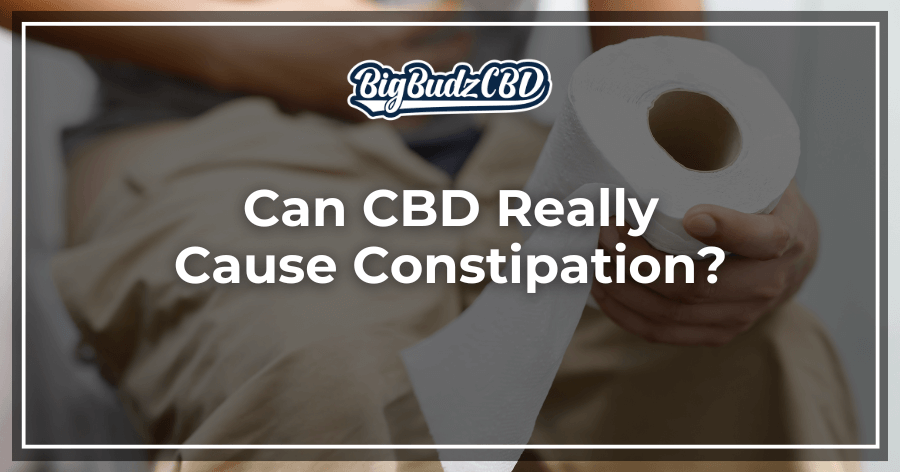Imagine starting CBD for anxiety or pain relief. But then, your digestive system slows down.
Is CBD causing your constipation?
Or is there more to this story?
Let’s explore CBD’s effects on your gut, separating fact from fiction.
CBD, or cannabidiol, has become very popular.
You can find it in softgels, oils, and gummies.
These products claim to offer many benefits.
But, some people say their bowel movements change after using CBD.
Could this popular product really cause constipation?
We’ll look into how CBD affects your gut.
We’ll also check out cases of CBD-related constipation.
And we’ll give tips for keeping your digestive system healthy while using CBD.
Knowing how CBD affects your gut is key for a good CBD experience.
Key Takeaways
- CBD’s effects on the digestive system are complex and not fully understood
- Some users report constipation as a side effect of CBD use
- The endocannabinoid system plays a role in gut motility and inflammation
- Factors like dosage, product type, and individual physiology can influence CBD’s impact
- Proper hydration and fiber intake are crucial when using CBD products
- Consult a healthcare professional if experiencing persistent digestive issues with CBD use
What is CBD and how does it affect the digestive system?
CBD stands for cannabidiol, a part of cannabis plants.
It’s known for its health benefits, including how it affects digestion.
Let’s look at how CBD interacts with your gut and digestive processes.
Understanding CBD and its interaction with the gut
CBD interacts with your body’s endocannabinoid system.
This system helps control many body functions.
In digestion, CBD can change how your gut moves and how it reacts to inflammation.
A 2019 study found that people who used cannabis recently were 30% less likely to have constipation than others1.
The endocannabinoid system’s role in digestion
The endocannabinoid system keeps your digestive tract balanced.
It controls how your gut moves, inflammation, and pain.
CBD works with receptors in your gut, possibly changing these functions.
Research shows that cannabis affects these receptors.
This can change how your gut moves and reduce inflammation1.
Potential effects of CBD on gut motility
CBD might change how fast food moves through your system.
While there’s not much research, some studies suggest it could help with irritable bowel syndrome.
But, very high doses might cause constipation, though this is rare2.
| CBD Effects on Digestion | Potential Benefits | Possible Concerns |
|---|---|---|
| Gut Motility | May help with IBS symptoms | High doses could slow digestion |
| Inflammation | Potential to reduce gut inflammation | Effects may vary by individual |
| Pain Perception | Might alleviate abdominal discomfort | More research needed on long-term use |
Remember, how CBD affects digestion can differ for everyone.
Dosage, product quality, and health conditions all matter.
Always talk to a doctor before using CBD for digestive issues.
Does CBD oil cause constipation in some users?
CBD oil is popular for its health benefits. But, some worry about its impact on digestion.
The link between CBD and constipation is not simple.
Examining reported cases of CBD-related constipation
Some CBD users say it causes constipation, but it’s rare3.
Actually, CBD might make you feel like you need to go more often43.
Research shows CBD doesn’t usually cause constipation, even in heavy users5.
Factors that may contribute to constipation when using CBD
Several things can affect your digestion with CBD:
- Lack of fiber in diet
- Dehydration
- Sedentary lifestyle
- Certain medications
- Underlying medical conditions
- Stress and anxiety
These can slow down your gut and cause constipation, even without CBD5.
CBD gummies might upset your stomach because of sugar and gelatin5.
Differentiating between CBD oil and carrier oil effects
It’s important to know how carrier oils work with CBD.
Some, like MCT oil, can affect your bowel movements.
CBD might actually help your gut move better and ease constipation4.
| CBD Effects | Carrier Oil Effects |
|---|---|
| Regulates gut motility | May influence bowel movements |
| Potential anti-inflammatory properties | Can affect nutrient absorption |
| Helps relax nerve connections | May cause mild digestive discomfort |
CBD oil is unlikely to cause constipation.
But, your body might react differently.
If you have ongoing digestive problems, talk to a doctor about using CBD safely.
Can CBD gummies lead to constipation more than other forms?
CBD gummies are a tasty way to take CBD.
But, do they affect your digestive system differently than other CBD products?
Comparing digestive effects of different CBD products
CBD gummies are unlikely to cause constipation.
They might even help with it by soothing your digestive muscles and making stool movement easier6.
CBD oil, which often has carrier oils with laxative effects, is even less likely to cause constipation7.
Ingredients in CBD gummies that might affect bowel movements
While CBD itself doesn’t usually cause digestive problems, other ingredients in gummies might.
Sugar, artificial sweeteners, and additives could upset your stomach.
If you’re sensitive to these, you might prefer simpler CBD products.
Dosage considerations for CBD gummies and constipation risk
The risk of side effects, like constipation, often depends on the dosage.
New users, those taking high doses, or those consuming a lot daily are more likely to face digestive issues7. Start with a low dose and slowly increase it to find what works best for you.
| CBD Form | Constipation Risk | Other Factors |
|---|---|---|
| CBD Gummies | Low | Added ingredients may affect some users |
| CBD Oil | Very Low | Carrier oils may have laxative effects |
| CBD Capsules | Low | Easier dosage control |
Remember, how CBD affects you can vary. If you have digestive problems, try adjusting your dosage or switching to a different CBD form. Always talk to a healthcare professional if you’re worried about CBD and constipation.
How can I prevent constipation while using CBD?
If you’re using CBD and want to avoid constipation, there are steps you can take.
CBD doesn’t have to harm your digestive health.
Let’s look at ways to keep your bowel movements regular and support your gut health.
Tips for maintaining regular bowel movements with CBD use
To avoid constipation with CBD, eat foods high in fiber and drink lots of water. Include fruits, veggies, and whole grains in your diet8.
Regular exercise can also help move your bowels.
If you have digestive problems, start with a small CBD dose and adjust as needed8.
Choosing the right CBD product for digestive health
When picking CBD products for your gut, look at the company’s reputation and the quality of ingredients.
CBD gummies can help with gut motility and bowel movements.
Some people find CBD gummies help with constipation symptoms9.
Lifestyle changes to support gut health while taking CBD
Making lifestyle changes can greatly help your digestive health with CBD.
Try to manage stress, as it can affect your gut.
CBD can help with stress due to its effects on body receptors10.
Adding probiotics to your diet can also support a healthy gut.
Remember, CBD is usually safe, but talk to a doctor before starting it8.
Are there any CBD products that can help with constipation?
CBD products are getting attention for digestive support.
Research is still going on.
But, some CBD products might help with constipation.
Exploring CBD’s potential anti-inflammatory effects on the gut
CBD might help the gut by reducing inflammation.
This could make constipation symptoms better.
Studies show CBD might work by activating CB2 receptors, which lowers gut inflammation11.
CBD products marketed for digestive support
Now, many CBD products are for digestive health. These include:
- CBD oils with added digestive enzymes
- CBD-infused teas for gut health
- CBD capsules formulated with probiotics
These products look promising.
But, CBD might slow down gut movement, which could make constipation worse in some cases11.
Always talk to a doctor before trying CBD for constipation.
Combining CBD with other natural remedies for constipation relief
Some people mix CBD with other natural remedies for better digestive support.
This mix might help more with constipation.
Here’s a table of possible combinations:
| CBD Product | Natural Remedy | Potential Benefits |
|---|---|---|
| CBD Oil | Peppermint Oil | Soothing digestive discomfort |
| CBD Capsules | Ginger Extract | Promoting gut motility |
| CBD-infused Tea | Chamomile | Relaxing digestive muscles |
Research shows CBD might work with the GPR55 receptor to help gut motility and constipation11.
But, CBD’s effects can differ. Some studies say CBD might help with IBS symptoms like bowel changes and severe pain10.
If you’re thinking about CBD for constipation relief, start with a small dose and watch how your body reacts.
What should I do if I experience constipation after taking CBD?
If you’re dealing with CBD-related constipation, don’t worry.
There are steps you can take to find relief. CBD affects everyone differently, and some users may experience digestive issues.
Steps to alleviate CBD-related constipation
To ease constipation, try these simple strategies:
- Drink more water throughout the day
- Add fiber-rich foods to your diet
- Engage in regular physical activity
- Consider using CBD gummies instead of oils
CBD oil has shown potential in reducing gut inflammation and improving bowel movements12.
Early research suggests CBD can positively affect the digestive system.
It may relieve constipation by influencing receptors linked to intestinal motility13.
When to consult a healthcare professional
If your symptoms persist or worsen, it’s crucial to consult a healthcare professional.
They can rule out other underlying causes and discuss potential interactions with existing medications.
Remember, about 60 million Americans experience constipation at least once a year, so you’re not alone12.
Adjusting CBD dosage to minimize constipation risk
Dosage adjustment might help minimize constipation risk.
Start with a low dose and gradually increase it while monitoring your body’s response.
CBD oil can assist in promoting regular bowel movements, but it’s advisable to approach edible CBD products with caution if you experience chronic constipation13.
By following these steps and working with a healthcare professional, you can find the right balance for your CBD use and digestive health.
Can CBD cause constipation in dogs and other pets?
Many pet owners are curious about CBD’s effects on their pets’ digestive systems.
CBD Dog Oil and CBD Treats are not usually linked to constipation in dogs.
But, it’s important to know how CBD affects your pet’s body14.
Understanding CBD’s effects on animal digestive systems
CBD works with your dog’s endocannabinoid system.
It helps with inflammation, calming, and easing intestinal muscle tension14.
But, dogs might feel more sedated by hemp, which can slow down digestion15.
Start with a small dose and slowly increase it. Use about 0.25ml for every 10lbs of your pet’s weight15.
Recognizing signs of constipation in pets using CBD
CBD isn’t directly linked to constipation.
But, watch for any bowel movement changes in your pet. Look out for signs like nausea, vomiting, and hard, dry stool14.
If you see these signs, talk to your vet about your pet’s CBD use and health. You can find more info here.
Safe CBD usage guidelines for pet owners concerned about constipation
Always pick CBD products made for pets, like Serenity CBD’s Pet Lover Tincture15.
Follow the recommended dose and watch your pet’s reaction.
If they get constipated, try natural fixes like more exercise and water14.
Every pet is different. What works for one might not work for another.
By following these tips and watching your pet, you can keep their digestive system healthy while exploring CBD’s benefits.
CBD & Constipation FAQ
Q: Can CBD gummies cause constipation?
A: While CBD doesn’t typically cause constipation, some CBD gummies are made with ingredients that may contribute to digestive issues.
Factors like sugar alcohols or artificial sweeteners in gummies could potentially lead to constipation in some individuals.
It’s important to check the ingredients and consult with a healthcare professional if you experience any gastrointestinal discomfort.
Q: Is there a CBD product for constipation relief?
A: Some people use CBD products to help relieve constipation due to its potential anti-inflammatory properties.
While there isn’t a specific CBD product marketed for constipation, CBD oil may help alleviate symptoms for some individuals.
However, it’s essential to consult with a healthcare provider before using CBD to treat constipation, especially if you have chronic issues.
Q: How does THC differ from CBD in terms of digestive effects?
A: THC and CBD can have different effects on the digestive system.
While THC is known to potentially slow down digestion and may contribute to constipation in some cases, CBD doesn’t typically cause constipation.
In fact, some evidence suggests that CBD may help regulate bowel movements and reduce inflammation in the gut.
Q: Can the dose of CBD affect its impact on constipation?
A: The dose of CBD can indeed affect its impact on the body, including potential effects on digestion.
While CBD doesn’t directly cause constipation, taking very high doses might lead to side effects like changes in appetite or gastrointestinal discomfort.
It’s always best to start with a low dose and gradually increase while monitoring your body’s response.
Q: Is CBD effective for treating IBS and related constipation?
A: Some people use CBD for managing symptoms of IBS, including constipation.
While research is ongoing, CBD’s anti-inflammatory properties may help alleviate some IBS symptoms.
However, it’s crucial to work with a healthcare provider to develop a comprehensive treatment plan for IBS, as CBD alone may not be sufficient to manage all symptoms.
Q: Can CBD cause diarrhea instead of constipation?
A: Yes, some people may experience diarrhea as a side effect of CBD use, especially when taking high doses or when first starting CBD. This is more common than constipation as a CBD-related side effect.
If you experience persistent diarrhea while using CBD, it’s important to consult with a healthcare professional and consider adjusting your dosage.
Q: What are the common causes of constipation, and can CBD help?
A: Common causes of constipation include dehydration, lack of fiber in the diet, certain medications, and lifestyle factors.
While CBD doesn’t directly cause or cure constipation, it may help indirectly by reducing stress and inflammation, which can contribute to digestive issues.
For best results in treating constipation, combine CBD use (if recommended by a healthcare provider) with proper hydration, a high-fiber diet, and regular exercise.
Q: Are there any benefits of CBD for digestive health?
A: CBD may offer several benefits for digestive health.
Some people report that CBD helps reduce inflammation in the gut, regulates bowel movements, and alleviates symptoms of digestive disorders.
Additionally, CBD’s potential to reduce stress and anxiety may indirectly benefit digestive health.
However, more research is needed to fully understand CBD’s effects on the digestive system.
Q: What’s the best way to use CBD for potential constipation relief?
A: If considering using CBD for constipation relief, it’s best to consult with a healthcare professional first.
They may recommend starting with a low dose of CBD oil or capsules and gradually increasing if needed.
Combining CBD use with lifestyle changes like increased water intake, a fiber-rich diet, and regular exercise may provide the best results for managing constipation.
Always choose high-quality CBD products from reputable sources.


























